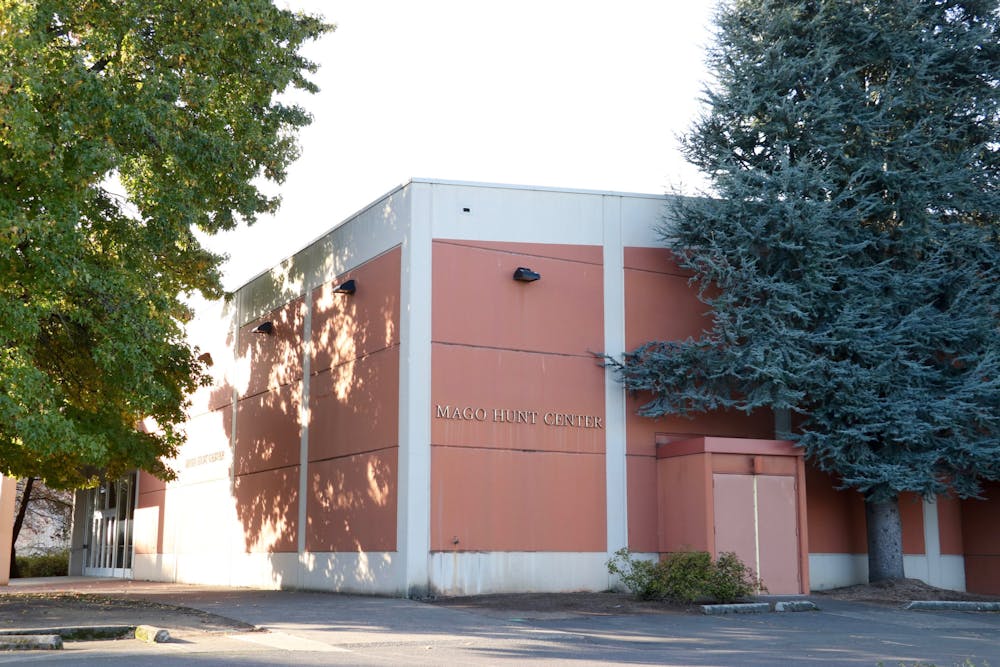Following the lead of local playhouses, Portland Playhouse, Artist Repertory Theatre and Shaking the Tree, the university’s theater department will offer free tickets to Indigenous peoples as an outlet to give back to groups subject to historical injustices.
Implementing the new ticketing policy is pertinent to the theater department’s inclusive vision, according to Andy Christensen, assistant professor of theater.
“It feels like we can’t do a play about Indigeneity without acknowledging this thing, in some small gesture like free tickets,” Christensen said. “Otherwise, we have no business doing a play about Indigeneity without engaging with our own relationship with it as a program.”
Indigenous peoples can get free tickets for all plays and seasons going forward. To reserve a ticket, an attendee can email boxoffice@up.edu, and a seat will be held for them in the auditorium. This can also be done in-person at the box office window.
Previously, the department’s effort to represent and uplift marginalized groups has included exercising land acknowledgements prior to all classes, rehearsals and shows.
“Every time we do a land acknowledgement, it sparks enlightening conversations about what they mean and in what ways we can practically engage in this initiative,” Christensen said.
According to the Native Governance Center, land acknowledgements serve as a symbol to represent the history of colonialism and how it has manifested lasting impacts in society today. They intend to hold space in a primarily-white institution to recognize discrimination against marginalized groups, specifically Indigenous peoples.
But they can also feel like an empty promise or a scapegoat from taking further actions towards the Indigenous rights movement.
“So you acknowledge the land is stolen, you know it’s stolen, and then you don’t restore it or do anything about that theft,” Christensen said. “This is a massive and complex social, cultural and national issue that we, at the university theater department, do not have the resources or scope to solve.”
The discourse led to a conversation about how the theater department can support marginalized communities like Indigenous groups. The conversation resulted in a policy change to offer free tickets to students and community members who identify as Indigenous or Native American. Christensen says this policy is the best way the program can contribute to the Indigenous rights movement.
Emily Hogan, academic coordinator for the performing and fine arts department, has been in charge of coordinating the policy with the University and external communities. Hogan believes this policy reflects the larger shift towards inclusivity in theater.
“There was a big push for accessible theater worldwide, so we’re meeting other local theater companies where they’re at,” Hogan said. “It’s a great idea, especially when we have this show that’ll be in the theater this November, called ‘The Thanksgiving Play,’ written by Larissa Fasthorse.”
“The Thanksgiving Play” was the first show by a Native American playwright to be performed on Broadway. Portland local Larissa Fasthorse worked with Artist Repertory Theatre to premiere the show in 2018. The play, starring D’Arcy Carden from The Good Place, made its Broadway debut in 2023 and has been picked up by theater companies, like the university’s, all over the country.
Hogan and Christensen have been in contact with the Native American Youth and Family Center and the Native Theatre Project to market the ticketing policy and welcome their members to the university’s programming.
“We were very conscious that we weren’t doing this just because we’re doing an Indigenous play,” Christensen said. “This play, and the process of selecting this play, have moved us into this policy that’s going to be in place for the foreseeable future.”
A consensus regarding the impact of land acknowledgements is still up in the air, but in the meantime the university’s theater program is intending to provide a creative space for people of color and marginalized communities.
“As a native person who is also white, I have a complicated history with both identities,” Hogan said. “But this policy change is exciting for me because it means that people that come from native backgrounds can feel like they are welcome to a seat at the table at our institution.”
According to Christensen, the theater department strives to have 50% of their playwrights and directors be people who identify as people of color or queer to diversify representation on stage. The department has also received feedback from Indigenous students and people of color about misrepresentation in the department’s shows.
“The theater program is becoming a predominantly non-white space, and in response to that we’ve been looking at things differently,” Christensen said. “Like saying, ‘What are the stories that haven’t been told?’ and ‘Who are our students?’ and ‘Who is writing the plays that represent these students in the world?’”
Policies such as this one are a step in the right direction for institutions like the theater department to cultivate inclusivity among its members.
“I hope this kind of policy invites Native people and students to feel empowered to get involved in theater,” Hogan said. “Especially when it can feel challenging at a majority white-populated institution.”
Clara Pehling is a news reporter for The Beacon. She can be reached at pehling28@up.edu








